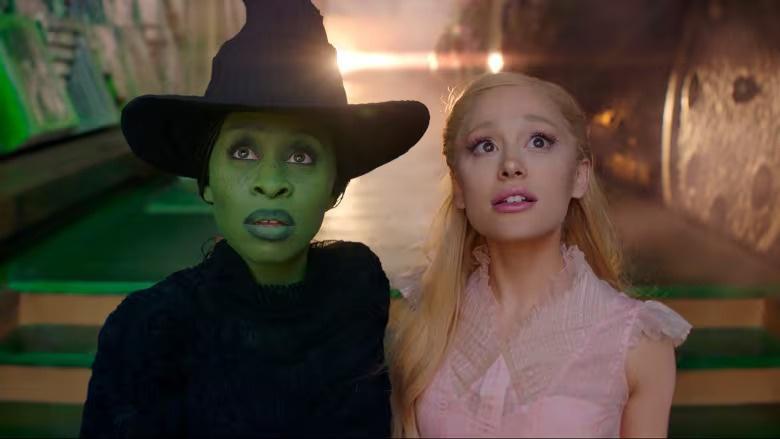Wicked retells the story of The Wizard of Oz, adding moral ambiguity to a simple story of good and evil, but should you watch the classic film before the new musical?
If you, somehow, have never seen The Wizard of Oz (1939), you’ve likely absorbed much of the story through cultural osmosis; homage, parodies and references.
Wicked follows the Wicked Witch, Elphaba (Cynthia Erivo), as she carves her maligned identity beside Glinda the Good (Ariana Grande).
Do You Need To Watch ‘The Wizard of Oz’ Before Watching ‘Wicked’?
It isn’t really necessary, no. But why would one pass on an excuse to watch The Wizard of Oz?
The Wizard of Oz is considered one of the greatest films of all time, and marks a historical milestone, made during the period in which Hollywood began to transition from black-and-white to Technicolor (which is why Dorothy literally steps into color upon entering the land of Oz).
At the very least, rewatching the film helps to familiarize yourself with the setting, and see the contrast between a modern musical, Wicked, and the 1939 classic.
The bare bones of the plot are all you need to know before sitting down to watch Wicked; there’s an evil Witch of the West and a good witch named Glinda the Good; the film explores their shared history, and how their reputations don’t quite match reality.
Wicked isn’t quite canon to any other Wizard of Oz story (and it turns out, there are rather a lot of them), but is a revisionist prequel that imagines a more complicated landscape than we see in other Oz films and books.
Is ‘Wicked’ A Prequel To ‘The Wizard Of Oz’?
Wicked is based on the second highest-grossing Broadway musical of all time, based on Gregory Maguire’s 2000 novel of the same name.
Wicked is the first part of a two-part story that will conclude in parallel to The Wizard of Oz, with many significant departures from the original.
In his book, Maguire explored the origin of the Wicked Witch, and asks how much of her wickedness was imposed upon her by a cruel and deceptive society. Wicked uses The Wizard of Oz as an inspiration, a launching point for a different kind of story.
Maguire’s novel is darker and more complex than the Broadway musical and film that have emerged from it, mirroring the trajectory of L. Frank Baum’s 1900 original novel The Wonderful Wizard of Oz, which has some notable differences from the famous 1939 film.
Wicked contains references to both the classic film and original Oz book, but uses Baum’s world as a template, creating its own lore that is only loosely connected to the original material.
Interestingly, Wicked features the shining silver slippers described in Baum’s original book, as Dorothy’s iconic ruby slippers were designed to show off the vibrance of Technicolor, and stand in stark contrast to the yellow brick road.
The Wizard of Oz is always a rewarding watch, but both the Wicked novel and the original Wizard of Oz books are distinct enough from their adaptations to be worth reading.
‘The Wizard Of Oz’ Books Inspired Many New Stories
With The Wonderful Wizard of Oz, Baum’s intention was to create a modern American fairytale, and he very much succeeded.
Baum’s story has inspired many spin-offs and variations, similar to how a folktale like Beauty and the Beast has been endlessly remixed and retold.
On the surface, Baum’s novel seems as simple as a Grimm’s fairytale, but slyly subverts tradition by depicting the titular wizard as a shameless conman, a slick salesman who, nonetheless, genuinely helps Dorothy and her party of outcasts.
The wonderful wizard is a heroic trickster who manages to fool the Cowardly Lion, the Tinman and the Scarecrow into self-confidence, which is really the only quality they all lack.
In the book, the Cowardly Lion is clearly a brave character from the very beginning, the Tinman is deeply empathetic, and the Scarecrow is highly intelligent; the three simply lack belief in themselves.
Through his deceit and theatrics, Oz manages to convince the three to embrace the positive qualities that they have clearly displayed throughout the story.
The Wizard of Oz explores the power of narratives, as almost every character is blinded by their own delusions, and can achieve their potential after believing the right kind of lie. Even the Emerald City is a false construct, with the wizard ensuring that all citizens and visitors wear green spectacles to make the city appear more dazzling than it really is.
Baum’s tale of a fantasy world of witches, wizards, scarecrows and corn fields blended the influences of the past into something new, rather like how George Lucas created Star Wars out of a hodgepodge of influences.
Just like Star Wars, the land of Oz has proved fertile ground for new stories, with some writers adding layers of nuance and ambiguity that were not present in the originals.
Caving to popular demand, Baum ended up writing many sequels to The Wizard of Oz, but his first story proved startlingly influential.
Wicked reframes the Wicked Witch as misunderstood, but also reinterprets the wizard as an outright villain, a fascist who is controlling Oz through nefarious means.
If Wicked sparks an interest in the Land of Oz, then there are many adaptations for newfound Oz-enthusiasts to enjoy.
One of the greatest (and most overlooked) is the 1985 film Return to Oz, blending two of Baum’s book sequels into a captivating story, in which Dorothy returns to find the Emerald City in ruins.
Dorothy gathers another party of outcasts and sets off to restore the land, but the film is full of eerie, unsettling moments, something of a horror movie for children, and contains some of the greatest special effects work ever put to screen.
There also The Wiz, a 1978 reimagining of The Wizard of Oz, with an all-Black cast, taking place in an urban fantasy land that is markedly different from traditional depictions of Oz.
There’s also Sam Raimi’s Oz the Great and Powerful (2013), which tells the origin story of the wizard of Oz; the film frames the wizard in a much more sympathetic light than Wicked.
The Wizard of Oz was also adapted into a Japanese anime series in 1986, titled The Wonderful Wizard of Oz. Baum’s novels were also adapted into comics by Marvel and DC, boasting a visually striking, faithful version of his story.
These are just a few examples; there are many films, TV shows and video games that explore the wonderful world of Oz.
The Oz movies and all loosely-related media are like a series of dreams that take place in the same location, but never with quite the same tone—Wicked is just the latest adaptation, and one that goes in a very different direction.
MORE FROM FORBES
Read the full article here





